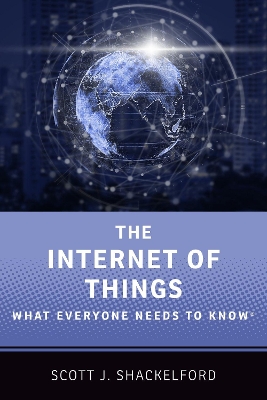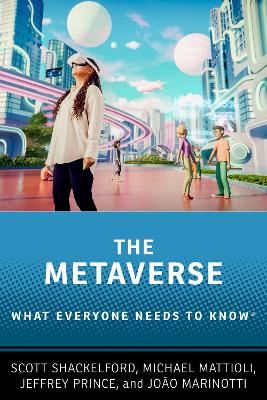What Everyone Needs to Know
2 total works
The Internet of Things (IoT) is the notion that nearly everything we use, from gym shorts to streetlights, will soon be connected to the Internet; the Internet of Everything (IoE) encompasses not just objects, but the social connections, data, and processes that the IoT makes possible. Industry and financial analysts have predicted that the number of Internet-enabled devices will increase from 11 billion to upwards of 75 billion by 2020. Regardless of the number, the
end result looks to be a mind-boggling explosion in Internet connected stuff. Yet, there has been relatively little attention paid to how we should go about regulating smart devices, and still less about how cybersecurity should be enhanced. Similarly, now that everything from refrigerators to stock
exchanges can be connected to a ubiquitous Internet, how can we better safeguard privacy across networks and borders? Will security scale along with this increasingly crowded field? Or, will a combination of perverse incentives, increasing complexity, and new problems derail progress and exacerbate cyber insecurity? For all the press that such questions have received, the Internet of Everything remains a topic little understood or appreciated by the public.
This volume demystifies our increasingly "smart" world, and unpacks many of the outstanding security, privacy, ethical, and policy challenges and opportunities represented by the IoE. Scott J. Shackelford provides real-world examples and straightforward discussion about how the IoE is impacting our lives, companies, and nations, and explain how it is increasingly shaping the international community in the twenty-first century. Are there any downsides of your phone being able to unlock your
front door, start your car, and control your thermostat? Is your smart speaker always listening? How are other countries dealing with these issues? This book answers these questions, and more, along with offering practical guidance for how you can join the effort to help build an Internet of Everything
that is as secure, private, efficient, and fun as possible.
end result looks to be a mind-boggling explosion in Internet connected stuff. Yet, there has been relatively little attention paid to how we should go about regulating smart devices, and still less about how cybersecurity should be enhanced. Similarly, now that everything from refrigerators to stock
exchanges can be connected to a ubiquitous Internet, how can we better safeguard privacy across networks and borders? Will security scale along with this increasingly crowded field? Or, will a combination of perverse incentives, increasing complexity, and new problems derail progress and exacerbate cyber insecurity? For all the press that such questions have received, the Internet of Everything remains a topic little understood or appreciated by the public.
This volume demystifies our increasingly "smart" world, and unpacks many of the outstanding security, privacy, ethical, and policy challenges and opportunities represented by the IoE. Scott J. Shackelford provides real-world examples and straightforward discussion about how the IoE is impacting our lives, companies, and nations, and explain how it is increasingly shaping the international community in the twenty-first century. Are there any downsides of your phone being able to unlock your
front door, start your car, and control your thermostat? Is your smart speaker always listening? How are other countries dealing with these issues? This book answers these questions, and more, along with offering practical guidance for how you can join the effort to help build an Internet of Everything
that is as secure, private, efficient, and fun as possible.
The Metaverse
by Scott J. Shackelford, Michael Mattioli, Jeffrey T Prince, and João Marinotti
Published 18 May 2025
This book explores whether the Metaverse - understood here as a persistent, immersive, and widely utilized, virtual world - will be the next chapter in the evolution of cyberspace, and what that means for people, business, and society.
The Metaverse. Depending on your perspective, it's the future of the Internet, the next generation of video games, or "a deeply uncomfortable, worse version of Zoom." In many ways, the confusion, overpromising, and hype are reminiscent of how the Internet itself was envisioned in earlier epochs.
A diverse range of firms are investing in Metaverse tech, causing a digital gold rush. There is plausibly a substantial first-mover advantage to be won, which Forbes has estimated to be north of a $1 trillion revenue opportunity. But there have also been questions raised about the utility of the Metaverse, with many firms, including Disney and Meta itself, pivoting to AI even as others like Apple release new products doubling down on spatial computing.
In the trademark question-and-answer style of the What Everyone Needs to Know® series, this book provides an understanding of what the Metaverse is, how it is different from virtual and augmented reality, and the emerging Metaverse economy. It looks at media, politics, speech, crime and security, and identity and privacy in the Metaverse. It explores how governance and law operate—or may operate—in the Metaverse, the rights of bots, and our Meta future.
The stakes are high, and confusion abounds, particularly in the public, making The Metaverse a perfect addition to the What Everyone Needs to Know® series.
The Metaverse. Depending on your perspective, it's the future of the Internet, the next generation of video games, or "a deeply uncomfortable, worse version of Zoom." In many ways, the confusion, overpromising, and hype are reminiscent of how the Internet itself was envisioned in earlier epochs.
A diverse range of firms are investing in Metaverse tech, causing a digital gold rush. There is plausibly a substantial first-mover advantage to be won, which Forbes has estimated to be north of a $1 trillion revenue opportunity. But there have also been questions raised about the utility of the Metaverse, with many firms, including Disney and Meta itself, pivoting to AI even as others like Apple release new products doubling down on spatial computing.
In the trademark question-and-answer style of the What Everyone Needs to Know® series, this book provides an understanding of what the Metaverse is, how it is different from virtual and augmented reality, and the emerging Metaverse economy. It looks at media, politics, speech, crime and security, and identity and privacy in the Metaverse. It explores how governance and law operate—or may operate—in the Metaverse, the rights of bots, and our Meta future.
The stakes are high, and confusion abounds, particularly in the public, making The Metaverse a perfect addition to the What Everyone Needs to Know® series.

